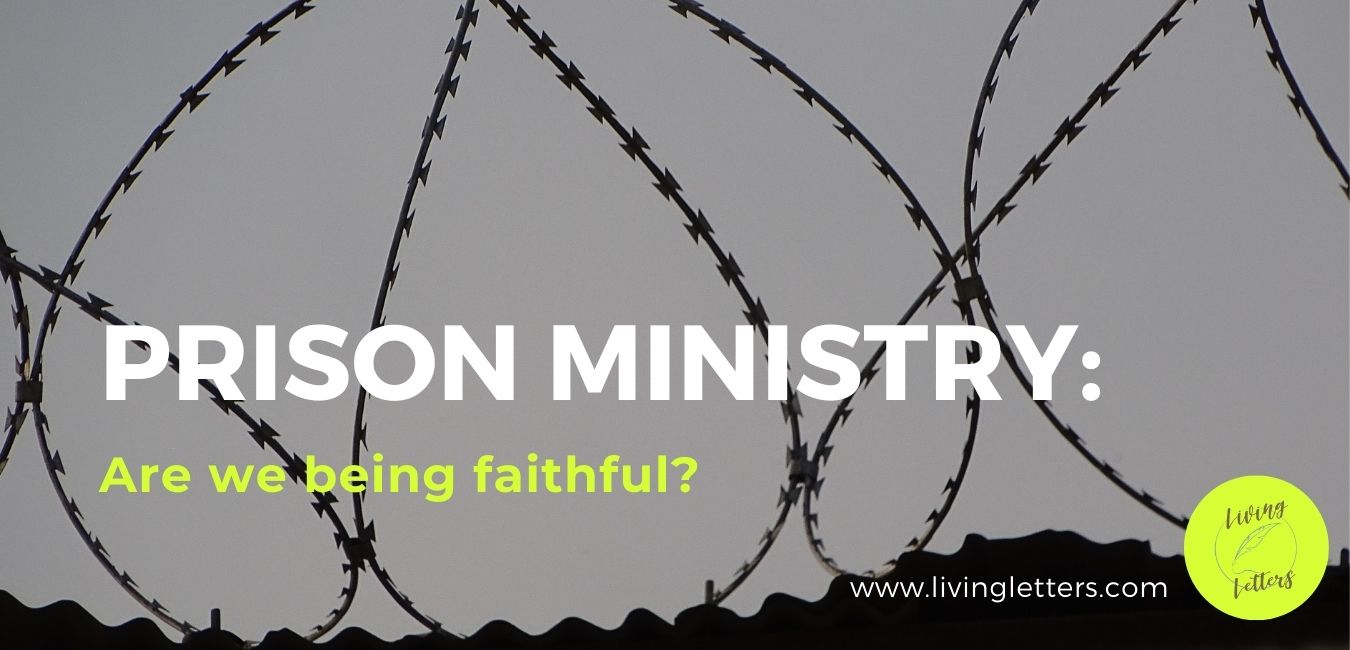
“When the Son of Man comes in his glory, and all the angels with him, then he will sit on his glorious throne. Before him will be gathered all the nations, and he will separate people one from another as a shepherd separates the sheep from the goats. And he will place the sheep on his right, but the goats on the left. Then the King will say to those on his right, ‘Come, you who are blessed by my Father, inherit the kingdom prepared for you from the foundation of the world. For I was hungry and you gave me food, I was thirsty and you gave me drink, I was a stranger and you welcomed me, I was naked and you clothed me, I was sick and you visited me, I was in prison and you came to me'” (Matthew 25:31-36).
In the early years of our marriage, my husband's work often took him into prisons in upstate New York. Once he was asked to give a speech to the inmates about viable legal choices available to them through the legal firm he represented. It just so happened that the date was during Thanksgiving break and my dad and my recently widowed sister and her children were visiting us. We, also, were invited to attend the event at which my husband would speak. How strange it was to pass through security and walk the pristine halls, entering a cafeteria full of convicted men. It made us a bit uneasy, despite our familiarity with the passage above.
The state of our prisons is often a political topic. Political candidates campaign on this issue, and it is mentioned in their party platforms. The media also brings it up. We read about trials and sentencing and rehabilitation, and we wonder if and how rehabilitation is occurring. We know that our American standards of prisons are much higher than those in some other countries. Inmates are fed three meals a day, given fresh air and exercise, and often are able to finish their high school educations or take college courses. The facilities are clean and medical care is available to every inmate. In some prisons, the prisoners are not as confined as in others, depending on their crimes and/or behavior.
“ We read about trials and sentencing and rehabilitation, and we wonder if and how rehabilitation is occurring. ”
Lately though, we hear much about overcrowding and that many prisoners, even a majority, are being held on charges related to illegal drugs. We hear many in our system are still awaiting trial. It often seems that criminal justice is a very slow process.
The Prison Policy Initiative is a non-profit organization that is concerned about our prisons. They keep prison related issues before the public and provide a sort of think-tank about related problems. Last year they published a report, “Mass Incarceration: The Whole Pie 2020,” (https://www.prisonpolicy.org/reports/pie2020.html). It's worth going there to take a look at the latest statistics of how many prisons and prisoners there are, and the reasons they are being held. A pie graph shows the numbers, and clearly state prisons far outnumber local jails, federal prisons, and an assortment of other facilities. Inmates convicted of violent crimes are the largest population of state prisons, although “one in five incarcerated people is locked up for a drug offense.” Slightly over a half million who are locked up have yet to be convicted or sentenced. They are simply awaiting trial.
Approximately 2.3 million people are incarcerated in the United States. That reduces to 698 for every 100,000 Americans, a higher per capita number than any other country. Such a great number of people requires a staggering number of workers, both inside the prisons and in the criminal justice process. Is government properly funding the needs? Does the money actually help the inmates in rehabilitation or does it pad the salaries of the workers? Are inmates personally being counseled to change their life styles and guided to resources that will help them live differently once they are released?
“ Slightly over a half million who are locked up have yet to be convicted or sentenced. ”
A 2019 report published by the Independent Women's Forum, titled, “The Importance of Prison Rehabilitation,” (https://www.iwf.org/2020/06/29/the-importance-of-prison-rehabilitation-programs-before-and-after-release/), cites a nine year study that showed “five out of six of released prisoners will be arrested for a new crime.” It is easy to be uninterested in these problems if our lives are untouched by being in or knowing anyone in the prison system.
Yet, we come back to the scripture passage above. Who is visiting the prisoners in our system? Even more important, who are we to neglect sharing the Gospel with this population? Isn't that exactly Jesus' point? Have we expected state officials and the judicial system to take on this responsibility so that we don't have to be bothered?
An interesting study by Barna Group in conjunction with Prison Fellowship in 2019 may have gotten to the heart of the issue. Reported in Christianity Today, (https://www.christianitytoday.com/news/2020/january/evangelical-prison-fellowship-criminal-justice-reform-barna.html), the results of that study showed that while evangelical churches are interested in legislative action regarding the criminal justice system and prisons working to rehabilitate prisoners, churches themselves take little action to raise awareness of this issue, participate in prison ministry, or serve those being released from prison or those who have loved ones in prison.
“ It is easy to be uninterested in these problems if our lives are untouched by being in or knowing anyone in the prison system. ”
“Less than one in four (22%) evangelicals report that their churches have engaged in raising awareness about criminal justice in the past six months. By comparison, 65 percent of evangelicals say their churches have raised awareness of the sanctity of life, and 46 percent homelessness.” The issues of drug abuse, human trafficking, domestic violence, and race relations all scored higher in the amount of attention given to them by evangelical churches than issues involving the incarcerated.
The article in Christianity Today, “Evangelicals Support Prison Reform in Theory, but Less in Practice,” spoke with Jon Kelly, founding pastor of Chicago West Bible Church, who became a Christian while in prison. Kelly says, “When I preach, I will share my testimony, no matter the size of the church or the setting, and there are always people who come up and tell me that they have a loved one who is incarcerated. People in the congregation don't feel free to tell someone they have gone through that because it brings people great shame. A lot of pastors just don't know how much their churches are impacted by it.”
One in three Americans have arrest records, according to the article in Christianity Today, and 600,000 prisoners are released each year. Pastor Kelly comments that while doing in-prison ministry is important, he “would like to see Christians be willing to do the work of building relationships with people after they are released.” On occasion I have heard of church splits caused because of ex-convicts attending them.
“ One in three Americans have arrest records. ”
Probably the best-known prison ministry is Prison Fellowship (https://www.prisonfellowship.org/) founded in 1976 by Chuck Colson. Colson served as legal counsel during the Nixon presidential administration and was charged and convicted of obstruction in the Watergate scandal. His prison sentence had huge implications for Colson spiritually. He was a new Christian when he entered prison and upon leaving felt a call on his life to minister to prisoners for Christ. Prison Fellowship was born with a three-fold mission: (1) to share the gospel and minister to prisoners inside the prison system as well as those re-entering outside community, (2) to serve and care for their families, and (3) to advocate for prison reform. Their mission statement in that third area says it well: “Prison Fellowship advocates for a more restorative approach to justice that advances proportional punishment, constructive corrections culture, and second chances.”
Second chances, changed lives, new hearts—these are phrases that should resonate with those of us who call ourselves born again. It is easy for churches and individuals to partner and volunteer with Prison Fellowship. And there are many other Christian organizations working inside prisons and/or producing resources for that purpose. I will write about another in my next blog. There is really no excuse for local churches not involving themselves in prison ministry.
I know a pastor who has since gone on to claim his heavenly reward, who served as chaplain of a local jail. His witness to a client of our pregnancy resource center when she ended up in the jail, resulted in her accepting Christ. Though she was only there for a few days, this pastor never lost touch with her or her family. She was welcomed into the church he pastored and she was faithfully discipled and cared for. I met him when he came to court to advocate on her behalf. I witnessed first-hand the change in her because of Jesus, and although the praise belongs to God, I am thankful that this man was a willing vessel used for God's glory.
“ Second chances, changed lives, new hearts—these are phrases that should resonate with those of us who call ourselves born again. ”
Those in prison may be a neglected mission field for many churches. It could be that we who claim our love for Jesus are part of the problems within the prison system. We don't think a lot about that coming judgement day. Those who actually have seen their Lord in the faces of those who need Him—have offered them a glass of water, fed them, clothed them, visited them on their sickbeds, gone to them while they are imprisoned—will be recognized and rewarded by the Savior they love. It is at that moment these sheep will be separated from those who thought they knew Jesus, who said they knew Jesus, but never lifted a finger to serve Him.


Send Me A Message